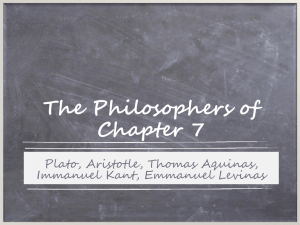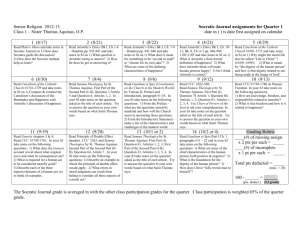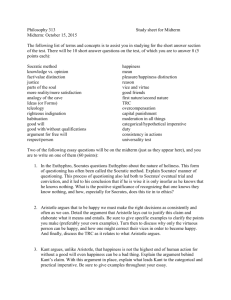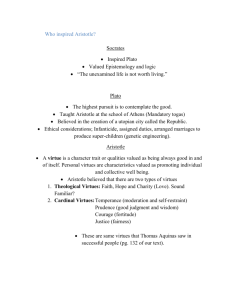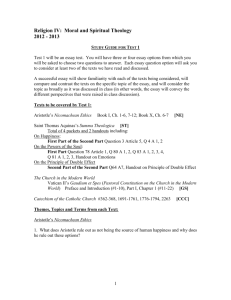Unit III Thinkers text
advertisement
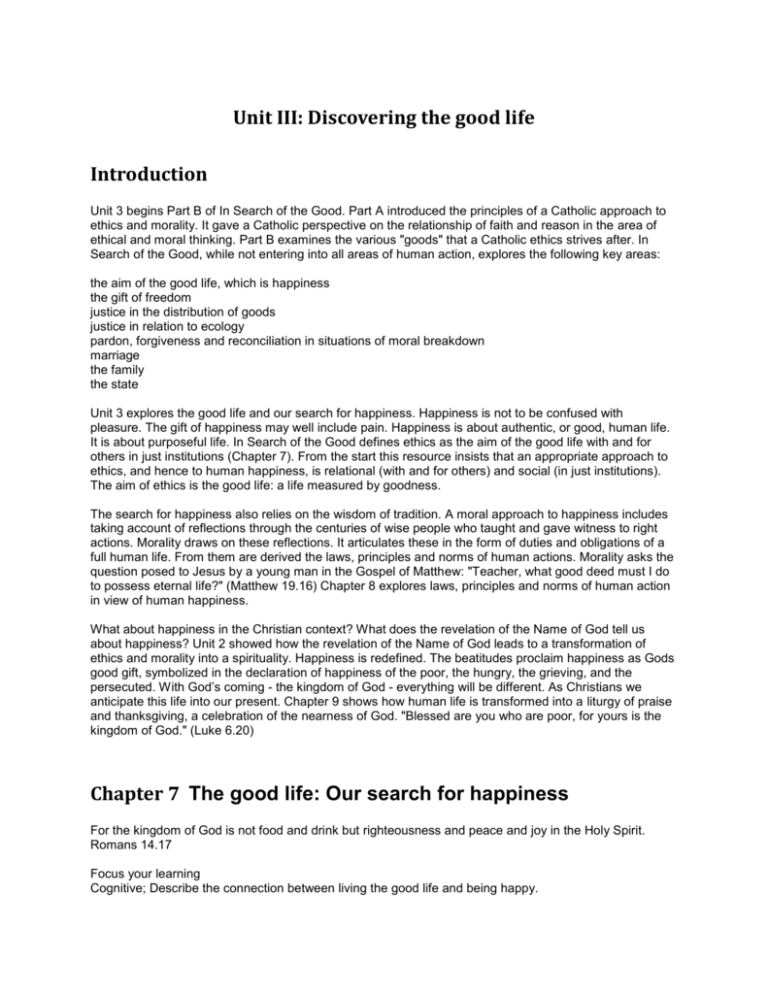
Unit III: Discovering the good life Introduction Unit 3 begins Part B of In Search of the Good. Part A introduced the principles of a Catholic approach to ethics and morality. It gave a Catholic perspective on the relationship of faith and reason in the area of ethical and moral thinking. Part B examines the various "goods" that a Catholic ethics strives after. In Search of the Good, while not entering into all areas of human action, explores the following key areas: the aim of the good life, which is happiness the gift of freedom justice in the distribution of goods justice in relation to ecology pardon, forgiveness and reconciliation in situations of moral breakdown marriage the family the state Unit 3 explores the good life and our search for happiness. Happiness is not to be confused with pleasure. The gift of happiness may well include pain. Happiness is about authentic, or good, human life. It is about purposeful life. In Search of the Good defines ethics as the aim of the good life with and for others in just institutions (Chapter 7). From the start this resource insists that an appropriate approach to ethics, and hence to human happiness, is relational (with and for others) and social (in just institutions). The aim of ethics is the good life: a life measured by goodness. The search for happiness also relies on the wisdom of tradition. A moral approach to happiness includes taking account of reflections through the centuries of wise people who taught and gave witness to right actions. Morality draws on these reflections. It articulates these in the form of duties and obligations of a full human life. From them are derived the laws, principles and norms of human actions. Morality asks the question posed to Jesus by a young man in the Gospel of Matthew: "Teacher, what good deed must I do to possess eternal life?" (Matthew 19.16) Chapter 8 explores laws, principles and norms of human action in view of human happiness. What about happiness in the Christian context? What does the revelation of the Name of God tell us about happiness? Unit 2 showed how the revelation of the Name of God leads to a transformation of ethics and morality into a spirituality. Happiness is redefined. The beatitudes proclaim happiness as Gods good gift, symbolized in the declaration of happiness of the poor, the hungry, the grieving, and the persecuted. With God’s coming - the kingdom of God - everything will be different. As Christians we anticipate this life into our present. Chapter 9 shows how human life is transformed into a liturgy of praise and thanksgiving, a celebration of the nearness of God. "Blessed are you who are poor, for yours is the kingdom of God." (Luke 6.20) Chapter 7 The good life: Our search for happiness For the kingdom of God is not food and drink but righteousness and peace and joy in the Holy Spirit. Romans 14.17 Focus your learning Cognitive; Describe the connection between living the good life and being happy. Practical; How must you involve others in your efforts to live the good life? What skills are required to attain happiness? Affective; Name the ways that you are supported throughout your life as you seek the good life. Key terms in this chapter chastity; friendship; good; happiness; institutions; solicitude; temperance; virtue Key thinkers Plato; Aristotle; Thomas Aquinas; Immanuel Kant; Emmanuel Levinas; Richard G. Cote The good life and happiness Who doesn't dream of the good life? You are in school, applying yourself to your studies, sport and activities, because you understand that somehow, by developing your mind and body and spirit, you will have greater access to "the good life." We are convinced that living "the good life" will bring us happiness. Blaise Pascal was probably right when he said, "All people seek to be happy, even those who are about to hang themselves." It is universally acknowledged that despite all setbacks and failures, sickness and disability, people want to be happy. And if they revolt against their current life situation, as Albert Camus wrote in The Rebel, it is because deep down they believe that they can be happy if only something were different. The search to be happy lies behind every human vocation, every choice we make, even when we are depressed or act in anger. It is one of our deepest convictions that happiness is our due. The Christian tradition has always believed that we were created for happiness. It recognizes this desire for happiness as natural, insisting that God has placed it in the human heart. (CCC #1718) We all want to live happily; in the whole human race there is no one who does not assent to this proposition. St. Augustine This desire for happiness is connected intimately with ethics and morality. All ethical theories insist that ethics is in search of the good. When we act, we do so to obtain a good. We play sports, we eat, we go on dates, we shovel someone's driveway, all for some good. It is not difficult to name a good in each of these actions. It may be friendship, challenge, competition, stilled hunger, love, sex, success, or any of the other things we go after in life. Our actions are never neutral. Even when I choose to do something evil, my motivation for doing so is not that it is bad. I will always choose even the wrong, or evil, action because there is some good in it for me - at least something preferable to the alternative. How is this good connected with happiness? Most ethical thinkers propose that the good life, that is, the ethical, moral life, is also the happy life. In the good that we seek, we seek also our happiness. In this chapter we examine the way five thinkers understand the link between happiness and moral goodness. The search for the good and the desire for happiness has preoccupied ethicists and moralists for centuries. You will meet Plato, the father of philosophy, and also revisit Aristotle, Kant and Levinas, whom you met in Chapter 1. You will also be introduced to Thomas Aquinas, one of the most influential theologians in the Church, from the thirteenth century. We will look at what each of these thinkers has to say about the good and how human effort to seek happiness is connected to the human search for the good. Finally we will examine the impact of the good on ethics and moral living. Plato (427-347 BC) Plato (left) and Aristotle, detail from the School of Athens, 1508, by Raphael Sanzio. (image: omitted) Our search start with Plato, the teacher of Aristotle. Plato had a high regard for the good, comparing it to the sun: Just as the sun is the source of light and through its light we can see things, so the good shines upon all our actions and is in all our actions. We cannot locate the good anywhere, because it is in all things without being something itself. Nowhere do we find the good; we find only good things. In this way the good is similar to beauty. Beauty is found everywhere and in all things, but nowhere do we find beauty itself. The closest we come to the good, according to Plato, is in contemplation. In contemplation we bask in the good and the good enters into our knowing. In contemplation it is as if the good radiates its warmth in us and through us to life. That is why Plato had such a high regard for philosophy. As contemplatives of the good, philosophers are, according to him, closest to the good. They have chosen the best - the happiest life. They are happy because they know how to act in accordance with beliefs; they make true choices about the value and worth of their actions. All others, he holds, are ruled by feelings. They measure their actions by how much they enjoy them, and not by their value. The philosopher chooses particular actions because these actions are true. In his book The Republic, Plato wrote at length about an ideal city-state where the philosopher would be king. He realized, of course, that a state which gave such high regard to the contemplation of the good might not be a very effective state practically speaking. In fact, when some of his ideas were put into practice in Sicily, they were a downright disaster. In his time Plato had to struggle against a movement known as sophism, which threatened to undermine all morality. Sophists proclaimed there could be no truth; all so-called truth is no more than opinion. If there is no such thing as absolute truth, then there can be no such thing as a universal moral code. In their view, moral values were nothing more than individual or cultural opinion. The sophists held that life is ruled by basic needs and desires, not by reason. A sophist named Callicles, for example, argued that the best life is a life of sensual pleasure. (1) In fact, the sophists held that it was useless to argue about the good in general. Neither goodness nor justice exists on its own, they said. There are only good people or just people. They refused any kind of thinking about moral principles or the good. With sophists ridiculing all moral reasoning about the good, there could be no agreement on how citizens should act. The state, according to Plato, had deteriorated to a near-total moral collapse. What ruled the state was the private pleasure of greed, the satisfaction of elemental needs for food and drink, sex, and the desire for power. This crisis led Plato to look for something that could stem this flood of social disorder and anarchy. He found it in and through reason. Reason, he said, finds the good that pervades everything. The highest pursuit in life is to contemplate the good. Guiding questions 1. Plato places a high value on the philosopher's search for the good. Why is the philosopher's search to be preferred over that of others? 2. Where does Plato locate the good? How do we attain it? 3. In which areas do you agree with Plato? Where do you disagree? Aristotle (384-322 BC) Young people can become mathematicians and geometers and wise in things of that sort; but they do not appear to become people of practical wisdom. The reason is that practical wisdom is of the particular, which becomes graspable through experience, but a young person is not experienced. For a quantity of time is required for experience. Aristotle You have already learned much about Aristotle’s philosophy and his ideas about the good in Chapter 1. We return to him in this discussion because his theory has influenced much of the Church's moral thinking. Aristotle’s concern for the good, as was Plato's, arose out of political considerations. After all, he became a philosopher in the king's court when he undertook the education of Alexander of Macedonia. Aristotle agreed with Plato about many things. All people aspire to some good and all seek to be happy. Like Plato, he was concerned with the short-sightedness of searching for happiness by following one's instincts and sensual pleasures. The search for happiness and the good, he felt, has more to do with acting intelligently than it does with following one's inclinations. Also, like Plato, he thought that philosophers were the most likely to succeed in the search for happiness and the good. Aristotle was more down-to-earth than Plato. He considered Plato's idea of the good too abstract. According to Aristotle, people do not find the good; they find a good. When I go to the doctor, I want not health in general, but my health. My search must be identified with something real. The good, according to Aristotle, is to be found in God, for God is the mover of all things. The good is inscribed by God into the nature of all created things. To search for the good is to go to each thing and discover there its potential. In each case one needs to ask: What is the purpose or aim of this thing? How can it best achieve this aim or goal? Aristotle still thought that Plato was on the right track when he said that contemplation is the highest good. Review of Aristotle’s theory of the good Absolute good can be found only in God. Good is inscribed by God into the nature of all things. To find the good in anything is to discover first its purpose, what it is for. A person develops good character by acting virtuously. Virtues serve to control passions. The good is found in the middle ground rather than in the extremes. The mark of humanity is the ability to reason and to act rationally. To act ethically is to engage our capacity to reason. The highest form of happiness is to live an ethical life. However, Aristotle’s contemplation is not of the idea of the good, but of the good that is within all things. For him it was important to know the nature of each thing. That is why he was so interested in the sciences and politics. He appreciated the practical. Each thing has an end and each thing is oriented toward the good so long as it is oriented to its end. So what about human beings? For Aristotle people are self-directed beings. They can discover who they are and can orient themselves to their end through reason. Aristotle held that people act and reflect as they find themselves in particular situations. People seek concrete goods. What do I do here and now? Since we are already naturally oriented towards what is good, humans have to use their reason to decide what to do in each case. His advice is to avoid the extremes. Someone who aims at the middle ground is a good and wise person, a happy person. (2) Guiding questions 1. What good would Aristotle have you strive after? 2. Evaluate Aristotle's notion of extremists. In what way are they similar / dissimilar to extremists today? 3. What is the middle way in life? How would a typical student apply this principle in his or her life? 4. What do you think of the role Aristotle assigned to the practical, wise person? Can you identify such a person in your life? St. Thomas Aquinas (1225-1274) Until the thirteenth century the main influence upon Christian theology and moral thinking derived from Greek philosophers came from Plato. From the eleventh century onwards, there was a gradual discovery of the works of Aristotle in the West. Most of these writings came to the West through the Arabs. Their high civilization and refined scientific thinking began to filter through in Western centres of thought, particularly in the newly founded Universities of Paris, Bologna and Salamanca. Most significantly, Thomas Aquinas, a Dominican friar, incorporated Aristotle's thinking into theology. He made extensive commentaries on Aristotle's ethics. Aquinas's two major works, his Summa contra Gentiles and Summa theologica, reflect the impact that Aristotle's ethical thinking had upon him. In his texts he calls Aristotle "the philosopher." Like Aristotle, Aquinas insisted that the ethical comes from the end that is inscribed in the nature of all creatures. What something is for is placed in the very core of what something is. At a person's core, Aquinas said, is a desire for the good. Following this natural desire for the good is the basis of ethics. Aquinas, as did Aristotle, equated God with the highest good. For Aquinas, however, this God is the Trinitarian God of Christianity - Father, Son and Holy Spirit. Aquinas's faith in the resurrection of Christ and the immortality of the human soul allowed him a vision of life with a much more refined notion of the end of human beings. Aquinas held that people were made for happiness. Aristotle had held this as well, and he had connected happiness with the good life lived by a virtuous person. Aquinas accepted this view but he added that human happiness was not exhausted with the good life lived on earth. Because of his belief in God’s love for us as shown in Jesus, Aquinas held that there is a fuller happiness - called blessedness - that is to be found only in a loving vision of God. The fullness of a good life is not to be found on earth; the full good life only comes in the resurrection as God’s pure gift. St. Thomas Aquinas Priest and doctor of the Church, patron of universities and students Feast day: January 28 Saint Thomas Aquinas, by Bernadino Mei (1615-1676) (image: omitted) Thomas Aquinas was born either in 1225 or 1227 into a noble family. His father, Landulph, was Count of Aquino, and his mother, Theodora, was Countess of Teano. The family was related to Emperors Henry VI and Frederick II, and to the Kings of Aragon, Castile, and France. When Thomas was five years old, his parents placed him under the care of the Benedictines of Monte Casino who were to teach him and ensure a proper upbringing. He was an exceptional student. At the age of eighteen, Thomas decided to turn his back on noble privilege and to enter the Order of St. Dominic in spite of his family's opposition. Some members of his family were so upset with his decision, that they kidnapped him and locked him in a tower for over a year, trying to change his mind. They even sent in a woman to try to convince him that religious life was not for him. The story goes that he chased her out with a burning stick from the fireplace. The family finally relented, and he rejoined his Dominican friars. He received the finest university education under the best teachers of his time, and his clarity of thinking and breadth of knowledge became legend. Even so, he received the nickname of "dumb ox" since he was quite large, and his humility was interpreted by some as dullness. At the age of twenty-two, he was appointed to teach in Naples, during which time he also began to publish his first works. Four years later he was sent to Paris to teach at the Dominican school, and for further study at the University of Paris. At the age of thirty-one, he received his doctorate. While in Paris, he was befriended by King Louis IX, with whom he frequently dined. In 1261, Pope Urban IV called him to Rome where he was appointed to teach. Later, Pope Clement IV appointed him the Archbishop of Naples, but Thomas begged him to be excused from the appointment so that he could continue to teach and to write. If he had accepted the appointment, his greatest work, the Summa Theologica, would probably not have been written. Even so, on December 6, 1273, he decided that he could write no more. It appears that during Mass on that day, he experienced an unusually long ecstasy. To a fellow priest, Father Reginald, he said: "I can do no more. Such secrets have been revealed to me that all I have written now appears to be of little value.” Thomas died while travelling to the Council of Lyons convened by Pope Gregory X. He died at the Cistercian monastery of Fossa Nuova in 1274. St. Thomas was one of the greatest and most influential theologians of all time. He was canonized in 1323 and declared doctor of the Church by Pope Pius V. (3) Aquinas's ethics operated on two levels. He followed very closely what Aristotle had said about the good life and the happiness of the person who lives well and acts well. He too believed that people live the good life by using their intelligence and also their other capabilities, such as their senses, desires and physical abilities. For Aquinas, Gods creation is good. To know how to use one's intellectual and sensual capacities, Aquinas said, one must follow the natural law, which he described as "nothing other than the light of understanding placed in us by God; through it we know what we must do and what we must avoid." (4) Like Aristotle, Aquinas had a lot to say about virtues. Much of his ethical writing is taken up in exploring examples of successful living. In particular, he identifies four virtues that successful people have: 1. prudence (how to reason well in moral decision-making) 2. temperance (how to remain moderate in the exercise of the emotions) 3. fortitude (how to be courageous in the face of life's difficulties) 4. justice (how to act well in relation to others) Traditionally these have been called the cardinal virtues (cardinal: from the Latin cardo, meaning hinge). These virtues are the "hinges" supporting human life. Aquinas identified a second level of moral life that had no place in Aristotle's thinking. God’s self-gift to us in Jesus and the Holy Spirit changes the way we define what is good. Aquinas here introduces the three virtues of faith, hope and charity. The initiative for these virtues does not lie with us. Charity, for example, is first of all God’s love for us. It is because God loves us that we can love others. Faith is first God’s selfrevealing action before it becomes a virtue in us. These virtues begin as pure gift. Our response to the gift is to accept it, to give praise and thanks, and then to live in accordance with the gift. The natural law expresses the original moral sense which enables man to discern by reason the good and the evil, the truth and the lie. CCC #1954 (image: omitted) Guiding questions 1. How is Thomas Aquinas similar in his thinking to Aristotle? How do they differ? 2. What is the highest good and happiness for Aquinas? Immanuel Kant (1724-1804) Kant’s notion of the good and happiness may seem the most difficult to follow. Kant lived in the period of the Enlightenment, a time characterized by the sweeping away of any sort of authority or religion except that which could justify itself in the court of reason. No more kings, no more priests, no more bibles, no more churches - unless they could prove by reason that they had a right to have authority. Only reason had authority. It is in this context that Kant sought to find an unassailable ground for ethics. Kant rejected an ethics such as proposed by Aristotle and Aquinas, which emphasized happiness as a by product of doing good. Kant argued that people who dare to take up the baton of reason will do good because it is their duty to do so. This is how people of reason act. They must find the reason for doing good within themselves. They must live autonomously. All the other goods in life - even intelligence, love, the experience of beauty or religious experience - are of lesser value than the good will. All these are only means to obtain a good will. Kant did, however, acknowledge the immortality of the soul because he realized that humans could not achieve the supreme good in this life. There must therefore be a life beyond this life. Kant’s God is a God who is also held to duty. Kant’s God has to make certain that human beings can indeed achieve the supreme good. In contrast with Aquinas's view, this supreme good is no longer the self-gift of God to us, but a necessary condition of reason. Faith, hope and charity lose their place in Kant’s ethical theory. Review of Kant’s theory of the good The only good is good will. Good is only good if it is done out of good will and provides no personal gain. An act is not moral if you enjoy doing it. Moral acts are performed out of duty and obligation. Reason dictates what is good. Guiding questions 1. What is the greatest concern in ethics for thinkers in Kant’s time? What did the Enlightenment stand for? 2. What is the moral price you must pay if as an individual you want to be free and independent of any authority? 3. According to Kant, how does a person act out of good will? What would motivate such a person to act morally? How do you understand "doing your duty for no reason than that it is your duty"? Emmanuel Levinas (1905-1995) Levinas places the infinite Good, who is God, at the hear of ethics. For Levinas the good comes as a call, a vocation. It does not come from myself. Recall the beggar in Chapter 1, asking, "Please, can you spare some change?" I must respond. Even if I refuse, the appeal follows me. When I am called to respond to another, I am called to be good without a reward, without any self-interest. In the face of another I am turned from myself and my own interests and desires toward the other. Levinas has a great appreciation for things like good food and wine, or the comfort of the home. However, he is keenly aware of the danger of being totally absorbed in caring for oneself. It is the other who awakens me to the highest good. Guiding questions 1. What is the highest good for Levinas? Where do we encounter it? 2. What good is there in it for me, if the other is higher than me? Three ways of pursuing the good You have met five thinkers who have something to say about the good life and happiness. Each of them says something different from the others, yet there is something attractive and right in each one's thinking. So which of these ideas is consistent with Catholic ethics? A Catholic approach to ethics and morality has three components: natural ethics, the role of obligation and the impact of the gospel. Teleological: natural ethics Catholic ethical theory frequently turns to Aristotle's teleological approach, as reflected in the work of Aquinas. Thomas Aquinas, for instance, begins with questions about human happiness. He then explores human actions, asking how evil enters into human actions, how actions are affected by passions and emotions, and how actions gradually become habits and virtues. He then explores human action from the perspective of God’s self-gift. The remainder of this chapter will show what such an approach might look like in practice. Deontological: obligation What is the role of obligation in our decision-making? What must we do in a given situation? How do we make a moral judgment, for instance, in an intolerable work situation with an abusive boss? What are the norms for human action? What is the role of laws and rules for human behaviour in particular circumstances? We will examine these and Kant’s deontological approach in greater detail in Chapter 8. Impact of the gospel The third component of a Catholic approach to ethics considers the impact of the gospel on us and on our actions. The gospel proclaims that the Son of God has entered human history as a man to open up possibilities for action that are motivated by God’s love in our hearts. Chapter 9 will explore this gospel dimension. Virtue Human virtues are firm attitudes, stable dispositions, habitual perfections of intellect and will, that govern our actions, order our passions and guide our conduct according to reason and faith. They make possible ease, self-mastery and joy in leading a morally good life. The virtuous man is he who freely practises the good. The moral virtues are acquired by human effort. They are the fruit and seed of morally good acts; they dispose all the powers of the human being for communion with divine love. CCC #1804 What makes for a good and happy person? In the "natural ethics" tradition of Aristotle and Aquinas - even if we will not follow them to the letter - we can discern at least three practical considerations: 1. How do we define the standards of excellence of the "good life"? 2. What is the role of the other in attaining the good life? 3. What is the institutional context of this good life? Paul Ricoeur defined this teleological ethics as "aiming at the 'good life' with and for others, in just institutions.” (5) 1. The standards of excellence of the "good life" There is an old saying: "Plant an act, reap a habit; plant a habit, reap a virtue; plant a virtue, reap a character; plant a character, reap a destiny." The saying repeats what we have stated right from the beginning: all "good life" starts with you - an agent - initiating a certain orientation in life. The more you repeat an action, the more set in your ways you become, the more your action defines who you are - your character. The question we ask here is how you as an agent may be helped in your pursuit of the good life. Are there examples to follow? What have wise people said? Are there standards of excellence we might look at? Are they the same for everyone? a) There are no recipes The Catholic tradition believes, as we saw in Chapter 4, that each person created by God is unique. From birth each of us is called by God to become the person that God created us to be. That is why each person is unique and irreplaceable and why each vocation is unique and irreplaceable. Hence there are no recipes that would serve each one in achieving his or her particular aim of life. But knowing the great tradition of human wisdom about a life of excellence helps. That is why the Catholic tradition places such an emphasis on the communion of saints, the people who have set standards of human excellence. It provides these examples to help each one of us plan our own path in life. b) Standards of excellence When someone is called to become a doctor or a priest, the aim of this calling is apparent: to heal or to make accessible life in Christ. Within that overall aim, it is possible - despite the individual differences of doctors and priests – to propose standards of excellence. Standards of excellence are sets of best practices. Consider the game of chess. Chess has certain strategies and rules without which it cannot be played. These strategies and rules are intrinsic to the game. One can learn the rules and the best practices of the grand masters. So it is with human life. Within the aim of human life it is possible to set certain standards of excellence. (6) c) The study and practice of virtue The standards of excellence in living the good life have a long history. They are known as virtues. We find frequent references to them in the works of Plato and Aristotle. Catholic thinkers quite happily borrowed from their wisdom about virtues. Literally, a virtue is a kind of excellence. Hence virtue in a student would be excellence in learning, in a printer its ability to print, in a knife its sharpness. In studying the virtues one can learn the human possibilities for excellence. Put in practice, virtues become the strengths, the solidity, of our character. For example, a just person is someone who consistently acts justly. It is not enough to have only a disposition for justice for it to be a virtue. The disposition to be just must be so entrenched as to not easily be lost. At that point it is a virtue.

